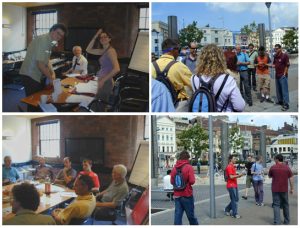News Story
KMi Takes To Bristol Streets
Marc Eisenstadt, Wednesday 16 Jun 2004
CitiTag, the wireless multiplayer game designed and developed jointly between KMi, HPLabs Bristol, and the Royal College of Art, was rolled out to the streets of Bristol today, garnering an enthusiastic reception among the players.
The premise of CitiTag is that a game of ultimate simplicity (tag), can be enhanced by empowering players with 'augmented reality': they play out in the real world rather than a simulated world, with extra 'super-human' capabilities (such as radar alerts) provided through portable technology. Complexity and innovation arise from the interaction amongst the players, rather than from the game technology and rules, which are kept simple.
For example, two innovations observed during today's play on the streets of Bristol were (a) a 'stealth assassin', wherein a player pretended to be on team A then switched suddenly to team B to quickly tag/capture opponents, and (b) an 'invincible tag team' with one 'sniffer' operating out in front of cohorts, so that if suddenly tagged he could be untagged by tag-team members out of range of the opponents.
CitiTag uses a combination of technologies which, despite the media excitement surrounding massively multiplayer games and 3G telephony, has hitherto been unavailable: in particular, CitiTag brings together GPS-satellite-tracking location services with WiFi networking to provide large multiplayer support in a modern handheld PDA, in this case an HP iPaq 4150.
CitiTag, designed by KMi's Yanna Vogiazou and Royal College of Art PhD student Bas Raijmakers, has been co-developed by a team from KMi's Centre for New Media (Kevin Quick and Jon Linney), who programmed the multiplayer networking capabilities, and Ben Clayton, Paul Marsh, Richard Hull from HPLabs Bristol, who programmed the Mobile Bristol GPS location-based support for the game.
KMi's Lewis McCann provided technical support during the game, along with HPLabs Stuart Martin and John Honniball. Jo Reid of HPLabs provided overall supervision and support for the project, along with KMi's Peter Scott and Marc Eisenstadt.
The photos above show, clockwise from upper left, the game equipment being setup and tested, the players getting their setup instructions out in St. Augustine's Parade in Bristol, the game in full swing, and a debriefing session at NESTA Futurelab in the Watershed at Bristol's Harbourside.
16 volunteer CitiTag players took part in today's experiment, which pushes the limits of GPS/WiFi integration: each technology is designed for radically different conditions, yet only this combination provides the full functionality needed to play the game. Although both WiFi and GPS signals have a tendency to 'drop out' in such a dynamic city environment (where even a passing bus can alter the signal characteristics), connectivity was 'good enough' to provide either a continuous or nearly-continuous gaming experience for at least a dozen of the players: enough to gather very valuable data.
Full analyses are now underway – and will form key elements of the PhD work of Yanna and Bas
Related Links:
Connected
Latest News
Three KMi researchers were recognised as top scientists in Computer Science at the OU
KMi’s Generative AI mini-Scotland Tour
AI for the Research Ecosystem workshop #AI4RE
KMi congratulates Dr. Joseph Kwarteng for successfully defending his doctoral thesis






